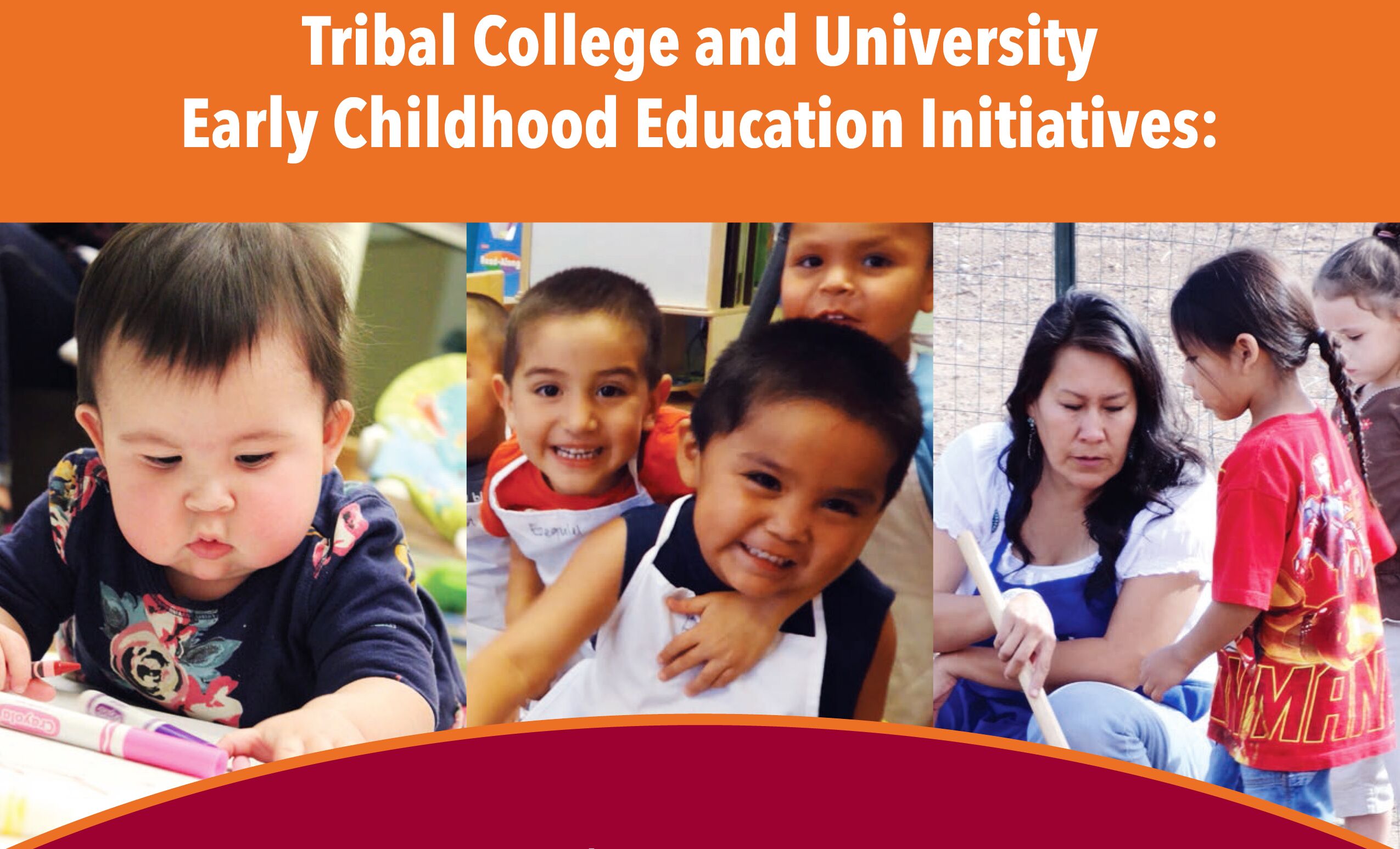Learn how your institution can work with your community to prepare young children for academic and social success at a foundational age by creating and providing a place-based, culturally appropriate education. Download our free landmark report detailing our work that has inspired an international movement: Tribal College and University Childhood Education Initiatives: Strengthening Systems of Care and Learning with Native Communities from Birth to Career.
Preparing children for college starts at birth. But the American Indian College Fund realized that a one-size-fits-all approach to education does not work for Native children. Six years ago, the College Fund set out to strengthen systems of care and learning for Native children by expanding opportunities for their families to consider college as a pathway to thriving communities, starting from birth to career, by incorporating the local culture into education. Today the College Fund released a landmark report detailing its findings from the work that has inspired an international movement, titled Tribal College and University Childhood Education Initiatives: Strengthening Systems of Care and Learning with Native Communities from Birth to Career.
Thanks to the College Fund’s Tribal College and University (TCU) Early Childhood Education Initiatives, entire Native communities are determining and providing place-based, culturally appropriate education for their young children to ensure their academic and social success at a foundational age.
The new report details how the College Fund built systems of early childhood care and learning founded on sustainable structures and implemented them at seven TCUs (accredited higher education institutions located on or near Indian reservations serving Native communities). Through the College Fund’s initiatives to date, 3,975 children and 2,398 families have benefited, while 1,185 teachers received training and professional development opportunities to better serve their communities.
The report shares early childhood education models that can be modified to meet specific community needs. It also includes information about growing partnerships with local and external education organizations, foundations, and professional organizations; engaging parents and families in curriculum development; utilizing the knowledge and experience of community elders; pursuing program excellence; documenting work and sharing findings to improve the work for sustainability; and transforming education in communities facing challenges.
The College Fund launched its first program in 2011, titled the Wakanyeja “Sacred Little Ones” Tribal College School Readiness and Success by Third Grade Initiative. The program was a five-year, $5 million dollar initiative funded by the W.K. Kellogg Foundation. Since 2011 the College Fund has launched three additional Native American early childhood initiatives: Ké’ Family Engagement, Cultivating Lakota Early Learning Opportunities, and Restorative Teachings. The College Fund awarded funding opportunities in the total amount of $7.25 million to TCU early childhood teacher education programs and faculty and TCU early learning centers and their partners, teachers, Native families, and children.
Seven TCUs participated in these initiatives: the College of Menominee Nation (Keshena, Wis.); Iḷisaġvik College (Utqiaġvik, Alaska); Keweenaw Bay Ojibwa Community College (Baraga, Mich.); Northwest Indian College (Bellingham, Wash.); Southwestern Indian Polytechnic Institute (Albuquerque, N.M.); Salish Kootenai College (Pablo, Mont.); and Sitting Bull College (Fort Yates, N.D.).
The initiative is directed by Tarajean Yazzie-Mintz, Ed.D., an enrolled member of the Navajo Nation and the Vice President of Program Initiatives at the American Indian College Fund.
Cheryl Crazy Bull, President and CEO of the American Indian College Fund, said, “As indigenous people who recognize the sacredness of our children and the impact that colonization has had on their lives, we are particularly moved by what we learned from our work. We have always known that parents and communities know best when it comes to the socialization of Native children. The College Fund and TCUs proved that we can do the work of our ancestors—to honor and educate young children—in modern institutions. We are grateful to the parents, teachers, and especially the children for bringing us to this point. We encourage more investment so more children can be reached.”
To request that Tarajean Yazzie-Mintz, Ed.D. speak at an event, or for additional information about the findings in the report and initiatives, please contact Tarajean Yazzie-Mintz at 303-426-8900 or tyazzie-mintz@collegefund.org.
To download a free copy of the Tribal College and University Childhood Education Initiatives: Strengthening Systems of Care and Learning with Native Communities from Birth to Career report, go to http://bit.ly/restorativeECE.
About Tarajean Yazzie-Mintz
Tarajean Yazzie-Mintz has devoted her career to improving access to early education for American Indian and Alaska Native children. She began her career in education as an early childhood teacher in Seattle, Wash., and continued to contribute to the field of early childhood education throughout her graduate studies at Arizona State University and Harvard University Graduate School of Education. After earning a doctorate in education degree from Harvard University, Yazzie-Mintz spent two years working in the Boston Public Schools before becoming an assistant professor in curriculum and instruction as a faculty member at the School of Education at Indiana University – Bloomington. There she worked as an assistant professor of curriculum studies, teaching in the teacher education program and curriculum studies doctoral program, and conducted research in the area of Native teacher knowledge and instructional practice.
Yazzie-Mintz has received numerous professional awards and honors and competitive grants and fellowships, has presented at scholarly meetings and symposia across the country, and has published in numerous scholarly publications focusing on education. She was named the 2016 recipient of Harvard Graduate School of Education’s Alumni Council Award for Outstanding Contribution to Education and was appointed by President Obama in January 2017 to the Board of Directors at the National Board for Education Sciences.
>>Download this Press Release Here

